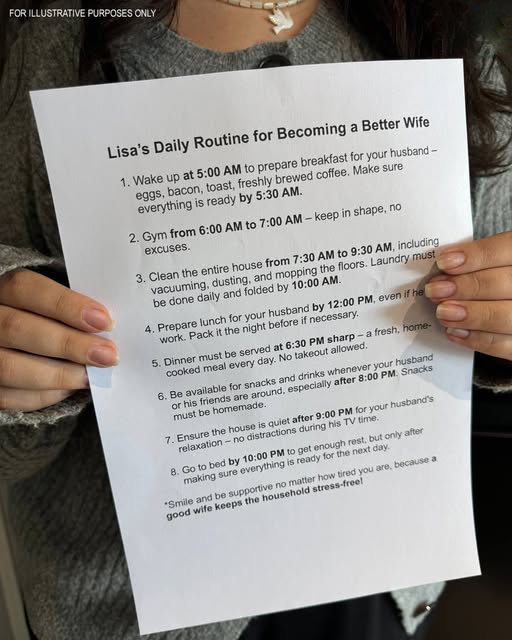When Ethan, my husband, first slid a piece of paper across our kitchen table, I assumed it was either a grocery list or some notes about our upcoming appointments. But surprisingly, it turned out to be something that left me absolutely speechless: a meticulously organized schedule that laid out how I could “improve” as a wife. Instead of impulsively casting it aside, I chose to handle this situation with a calm and thoughtful approach. While Ethan genuinely believed he could mold me into some kind of perfect wife with his neatly printed timetable, he had a real surprise coming his way.
Throughout our marriage, I’ve always seen myself as the steady one—calm, patient, and always willing to give others the benefit of the doubt. On the other hand, Ethan had a knack for embracing new ideas with an innocent excitement that was often endearing. Usually, these ideas were harmless—like a fancy new blender he was sure would turn us into health freaks or an online guitar class that he was convinced would unleash his inner rock star. Recently, however, Ethan had been influenced by his coworker Glen, who fancied himself as a “relationship guru” despite never having maintained a successful one. Glen had a reputation for being obnoxiously opinionated, especially about how wives should behave, and it seemed like Ethan had soaked up every one of his suggestions.

At first, Ethan’s hints were subtle yet intriguing. He would casually mention, “Glen thinks running a household is mainly a wife’s job,” or, “Glen says women should always stay attractive.” My usual response was a good eye roll or a sarcastic comment, hoping Ethan would eventually see the absurdity in such views. However, as time passed, it seemed like he was buying into these notions more and more, complete with a slight look of disapproval whenever I decided on takeout instead of cooking or let the laundry pile up until the weekend rolled around.
Then came the evening when Ethan decided to sit me down, smoothing out a printout as if it were an important contract. With a voice carefully composed to sound gentle yet authoritative, he told me, “I’ve been considering our marriage,” and added, “Marisol, you are an amazing wife, but I think there’s room for us to grow together.” His voice was laced with well-meaning tones, and he looked at me as if he were speaking to an underperforming gadget needing a tune-up. I could see a spark of excitement in his eyes. But I couldn’t help but wonder: Growth from whose perspective?
The document before me read “Marisol’s Weekly Routine for Becoming a Better Wife” in bold letters. I immediately felt my stomach churn. He had planned out my week in intricate detail, with every hour, from dawn until bedtime, mapped out to help me achieve some skewed version of domestic perfection.
Starting with a 5:00 a.m. rise to prepare him a lavish breakfast, I was supposed to follow that with a workout session to stay fit. Afterward, I’d dive into chores like cleaning and organizing before heading off to work. Despite having a full-time job, I was expected to return home to prepare gourmet dinners, serve fine hors d’oeuvres to his visiting friends, and ensure the house was sparkling clean before finally crashing to bed at night.
For a moment, I was stunned by the sheer audacity of his document. Ethan recommending I take on more domestic responsibilities was one thing, but presenting me with a detailed plan was like something from a 1950s “how-to” manual, reducing me to a mere character within its pages. And all this, inspired by Glen, a bachelor who wouldn’t recognize a balanced relationship even if it were dancing on his nose.
I could see Ethan’s face glowing with anticipation, likely expecting me to shower him with gratitude. Instead, I curbed my frustration, crafting my response with care. I donned a soft smile and said, “You know, Ethan, you might have a point. Maybe this kind of structure could be beneficial.” A wave of relief washed over his face, having received my words as acceptance of his proposal. Little did he know, I had no intention of following his schedule.
The next morning, while Ethan still slept, I sat with a cup of tea and revisited his ill-considered schedule. If he envisioned me as the “perfect wife,” perhaps it was time to illustrate that such perfection comes with a hefty price tag. Although his intentions were naive, I was determined to draft an invoice that outlined the real costs of his ambitions in terms of time, monetary value, and personal toll.
I settled at my laptop, methodically listing out all of Ethan’s suggestions. The gym membership? Sure, I could engage a personal trainer. But those services aren’t cheap. Let’s align on a baseline of $1,200 annually. Then there were the extravagant breakfasts and dinners, which demanded only premium ingredients. Surely, we couldn’t rely on organic produce and free-range selections magically appearing in our kitchen, and frozen pizzas just wouldn’t cut it anymore. Our grocery budget needed a bump, perhaps an additional $700 monthly.
If Ethan anticipated me hosting and cooking for his friends, then I needed some formal cooking classes, which—when paired with the appropriate equipment—would come at a fair sum. And let’s talk time. With my full-time job, how could I possibly squeeze in hours of chores each day? My salary would understandably vanish. Finally, I penned an important note: To compensate for this loss of income, Ethan should pay me what I previously earned—$75,000 annually. After all, if I was to become his dedicated homemaker, chef, and social coordinator, he would have to make up for my forfeited earnings.
And what about space? If he wanted to frequently entertain his friends, financially outfitting a specific area for this purpose seemed sensible. I made another point: $50,000 to create a “man cave,” ensuring that they wouldn’t impede on my finely orchestrated schedule or peace.
By the time I finished, the list bore witness to an unexpected chaos. Every demand Ethan set forth now had a price tag, whether financial, emotional, or both. I printed the document, set it beside Ethan’s original schedule, and labeled it “Ethan’s Plan for Supporting the Perfect Wife.” I was eager for him to make the comparison.
That evening, Ethan breezed into the kitchen, whistling a happy tune. Noticing my new document, he picked it up with a casual curiosity. “What’s this?” he asked, eyes scanning the page.
Initially, he attempted to chuckle, as if we were sharing a private joke. But as he tallied up the numbers—gym fees, grocery allowances, cooking lessons, compensation for my lost salary—his initial humor dissipated. By the time he reached the anticipated $75,000 a year stipend to cover my job earnings, all color had drained from his face.
“Are you serious?” he spluttered, stretching the paper in front of him as if it might attack. “$1,200 for a trainer? Hundreds more on groceries every month? And you want $75,000 as compensation? Marisol, this is insane!”
I feigned innocence, raising an eyebrow. “Darling, you were the one aiming for a flawless schema.” Achieving such ideals requires ample resources, doesn’t it? If I’m to devote my life to fulfilling these grand expectations, we have to treat it with the gravity of a genuine job opportunity.
He fumbled, leafing through page after page laden with expenses and adjustments. “But—this was meant to be helpful!” he protested. “I never wanted…”
“Exactly,” I remarked softly. “The oversight wasn’t just financial. It was about respect and partnership too.” Marriage isn’t a job where one person issues orders. It’s about collaborating, valuing each other’s time, and negotiating our roles. Your plan positioned me as little more than your in-house maid.
Ethan felt the realization hit like a weight of bricks, acknowledging the gravity of his blunder. The smugness that had marked his attempt for marital improvement was washed away by a new understanding. “I’m genuinely sorry,” he admitted, remorse evident in his voice. “I got caught up in Glen’s nonsense. He painted such a simple vision, where following a few directives would naturally reshuffle everything. It was never meant to belittle your contribution or worth.”
I nodded at his apology, allowing him to appreciate the weight of the hurt caused. “I love you, Ethan, but if you ever attempt to ‘fix’ me like that again, I’ll be forced to remind you of the very real benchmarks of your expectations.” In marriage, it’s vital that we function as equals.
With newfound revelation, he took the original schedule he had handed me and tore it in two, throwing the remnants into the recycling bin. I followed suit, shredding my compiled list until unrecognizable fragments remained.
For a short while, silence hung in the air—a mix of shared remorse and understanding bridging the gap between us. Then Ethan offered a wry smile. “I believe we both got our message across, haven’t we?” he chuckled gently.
Relieved, I mirrored his smile. “I think so,” I concurred. “Let’s redirect our focus and prioritize what genuinely matters.”
That night, we opted for takeout, sank into our couch, and reminisced about the qualities that initially bound us. Dismissing lists, routines, and skewed views of gender roles, we focused on the core aspects of our relationship: trust, kindness, and partnership. Our goal was to cultivate a life that suited us both, rather than chasing someone else’s distorted blueprint.
Both Ethan and I learned something crucial. Occasionally, a jolting confrontation with the ridiculous can serve as a wake-up call, reminding us that marriage isn’t a project where one molds the other into tangible plans. It’s about not just surviving, but flourishing together with mutual respect and understanding. In this sense, the shredded schedules disposed of were a small price to pay for achieving a healthy, equal partnership.




